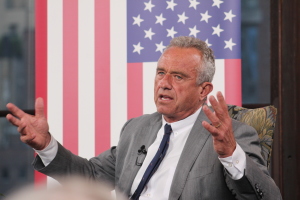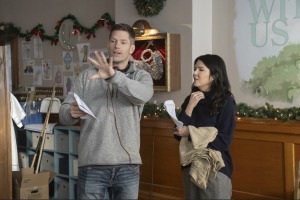Benny Hinn’s nephew details tragic tale of how televangelist exploits followers in new book
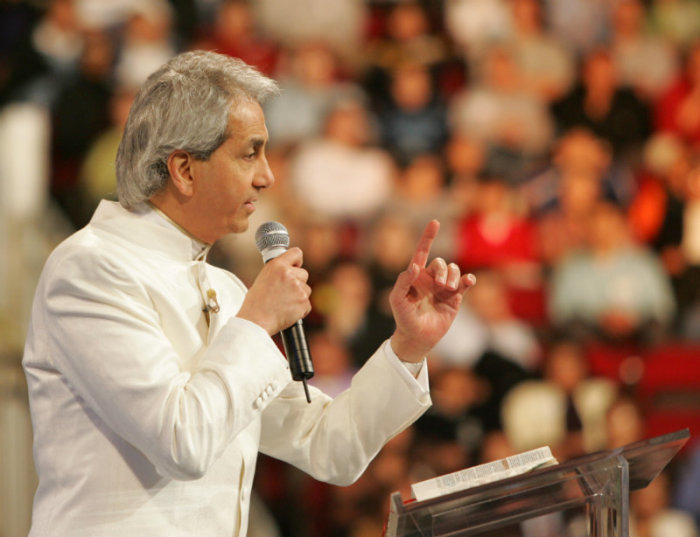
In September 2017, Costi Hinn, nephew of popular televangelist and faith-healer Benny Hinn, shared a brief testimony about why he defected from the family business of peddling the prosperity gospel to hapless adherents while living in the lap of luxury.
About six months later in February 2018, following the death of renowned evangelist Billy Graham, Costi’s controversial uncle, who has often been criticized for his endorsement of the prosperity gospel, made a stunning confession that sometimes he took the erroneous prosperity gospel too far.
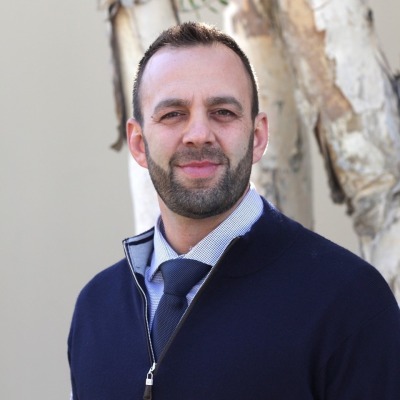
"We get attacked for preaching prosperity, well it's in the Bible, but I think some have gone to the extreme with it sadly, and it's not God's word what is taught and I think I'm as guilty as others. Sometimes you go a little farther than you really need to go and then God brings you back to normality and reality," Hinn, now 66, said as he reflected on Graham's death with a ministry colleague in a Facebook Live broadcast.
Now, in God, Greed, and the (Prosperity) Gospel: How Truth Overwhelms a Life Built on Lies, a new book set for release on July 9, Costi Hinn delivers a full-bodied testimony about the Hinn family’s exploitation of millions around the world with the prosperity gospel, and it’s a revealing, cautionary and tragic tale that attempts to atone for his role in it.
The 224-page book is an easy read but it will ebb and flow in parts depending on what you are hoping to learn about Benny Hinn’s operation.
Costi Hinn, who now runs his own ministry called For The Gospel, comes across as a bit preachy in parts, but he basically fleshes out the testimony he shared in 2017 and provides more background information on his uncle as well as himself to contextualize their motivations.
The book traces Benny Hinn’s desire for prosperity to his childhood ambition to prove his father — who did not expect much from him in life — wrong.
“My grandfather Costi, however, was not impressed with Benny, his oldest son. Costi would say to him, ‘Out of all my children, Toufik [his real name is Toufik Benedictus Hinn], you won’t make it.’ This crushed Benny’s young heart. He would think, Yes, I will make it! To this day, my uncle Benny has made it clear that his father’s words wounded him and motivated his desire for success in life. At the root of all of this family drama lies one thing: a father who wanted his son to work hard and make an honest wage, and a son who felt rejected by his father and set out to prove him wrong,” Costi Hinn writes.
He details the Hinn family’s journey to North America as Middle Eastern immigrants and the struggles they faced until Benny Hinn finds Jesus and begins to attract enough money and fame over the years to lure his brothers to join him in the business, including Costi Hinn’s father.
Costi Hinn would eventually grow up, after living a life of privilege from the spoils of ministry, to become an assistant to the uncle he once revered.
“My job was to be one of my uncle’s personal assistants when we traveled and to be a catcher during the healing services. I also served in this capacity with my father when we traveled for ministry events,” he notes of the two years he spent working in his uncle’s ministry.
“In less than just two years of working within the movement (not including growing up in it), I enjoyed more luxury than I ever could have imagined. It felt like I was hanging out with King Solomon. There are wealthy people who have lots of money but don’t live lavishly; then there are wealthy people who have lots of money and know how to turn lavish novelty into normalcy. We were the latter,” he explains in the book describing the life he enjoyed.
Here’s a sample of the travel arrangements, hotels, and shopping spree destinations I experienced during that almost two-year period:
• Air travel on a Gulfstream IV (average cost of ownership: $36,000,000)
• Royal Suite at the Burj Al Arab in Dubai, United Arab Emirates ($25,000 per night)
• Villa d’Este, Lake Como, Italy (near where George Clooney owns a lake house)
• The Vatican, Vatican City, Rome
• The Grand Resort Lagonissi, Greece (villas set on the Aegean Sea)
• The Lanesborough Hotel (London)
• The Mandarin Oriental, Mumbai, India
• The Ritz-Carlton, Paris
• The Ritz-Carlton, Laguna Niguel, California
• Shopping spree at Harrods in London
• Shopping spree up and down Rodeo Drive, Beverly Hills, California
• Hotel suites at the Hotel de Paris, Monte-Carlo, Monaco
• Gambling at the Casino de Monte-Carlo, Monaco
• Shopping spree in Monte-Carlo, Monaco
• Tours of Israel
• Presidential suite at the Grand Wailea, Maui, Hawaii
• Private beach house, Kona, Hawaii
• Vehicle chauffeurs in Bentley, Rolls-Royce, Mercedes Benz, Range Rover, Maserati
• Apparel by Versace, Salvatore Ferragamo, Gucci, Bijan
• Accessories by Louis Vuitton, Prada, Breitling, Chanel, Hermes, D&G
“Wealthy people who enjoy the finer things in life look at this list and shrug. Perhaps even people with modest levels of income say, ‘Big deal, so you enjoyed nice stuff.’ Both are right to view it with indifference — until we remind ourselves that this was paid for by donations from desperate people who believed that giving a prosperity preacher their money would result in their living this lifestyle too,” Costi Hinn writes. “Somewhat more heartbreaking is that some of these donors were just hoping to see a fifty-cent increase above their minimum wage as a blessing from God for sowing their seed. The hardest working people were the poor barely making it but giving everything to us.”
Benny Hinn doesn’t like the smell of India
The book also highlights interesting bits during Benny Hinn’s ministry, such as the time a group of conservatives in Helsinki, Finland, never invited the televangelist back to minister after a “slimy” fundraising gimmick Costi Hinn’s father used among the faithful that made them reluctantly donate money to the ministry in envelopes to be anointed with olive oil for blessings.
“Of all the methods we used for raising money, I had never before noticed just how slimy this one seemed (no pun intended). As much as I liked when revenue was high, some methods went a bit too far, even for us. I cringed. It was as though suddenly I had a conscience,” he notes.
After the service, he notes: “Our team had a meeting in our hotel room to count the offering. We divided the spoils among ourselves. Payment for the anointed impartation. Something inside didn’t feel right. We were never invited back.”
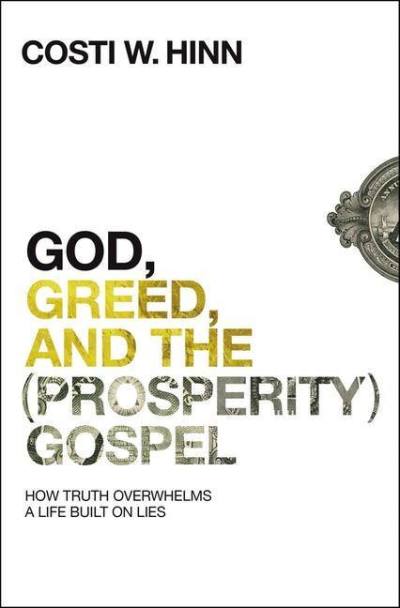
Costi Hinn also recalled a 2004 trip to Mumbai, India, where more than a million people responded to a Benny Hinn event for the first time but noted how turned off his uncle was by the smell of the country.
“The sights, sounds, and smells of that trip fill my memory to this day. ‘Close the door! Close the door!’ shouted my uncle from the comfort of our aircraft. I hadn’t been to India before, so I wasn’t sure what all the fuss was about. ‘I don’t want to deal with the smell until I absolutely have to,’ he explained to the flight attendant who had begun to open the aircraft door. Customs wasn’t coming our way yet, so Uncle Benny didn’t want the door opened. Apparently India had an aroma that my uncle didn’t care for,” he writes.
Even though Costi Hinn alludes on several occasions throughout the book to how he developed a conscience while serving in his family’s ministry, it wasn’t until his relationship with his now wife, Christyne, was threatened that he finally decided to step away from his family and support a more conservative theology.
In a Frequently Asked Questions portion of the book, Costi Hinn attempts to address concerns from critics, such as those who think he might just be trading on his family name to get rich and famous.
“My uncle has systematically exploited poverty-stricken countries for 40 years to get rich, and now other family members are following in his footsteps. Allow me to get painfully honest for a moment: for most of our family members, it can be pretty embarrassing to be a Hinn,” he notes.
“Many of us would prefer to be unknown, hardworking, honest people who die in obscurity having loved others and served God,” he adds. “Second, I am not famous and don’t want to be rich. I am nothing but a person who was transformed by the power of the true Gospel. Because of my last name, my story of being a pastor became interesting for people and created a sphere of influence, but I am just another ambassador for Christ taking His message to those I can reach. Whether my sphere of influence is two people or 2 million, I’m still going to do what people did in the Bible and testify of what God has done.”
In 2018, Benny Hinn admitted that as he has grown older and come to understand the Bible more, he now realizes that some of the things he learned from preachers when he was growing up aren't biblical and the popular interpretation of the prosperity gospel — the teaching that believers have a right to the blessings of health and wealth and that they can obtain these blessings through positive confessions of faith and the "sowing of seeds" through the faithful payments of tithes and offerings — is one of those things.
"The more you know the Bible the more you become biblically based and more balanced in your opinions and your thoughts because we are influenced. When I was younger I was influenced by the preachers who taught whatever they taught. But as I've lived longer I'm thinking wait a minute, you know this doesn't fit totally with the Bible and it doesn't fit with the reality. So what is prosperity? No lack. I've said this before," Hinn said.
He then elaborated on how he believes "no lack" should be interpreted.
"Did Elijah the prophet have a car? No. Did not even have a bicycle. He had no lack ... Did Jesus drive a car or live in a mansion? No. He had no lack. How about the Apostles? None lacked among them," Hinn said. "Today, the idea is abundance and palatial homes and cars and bank accounts. The focus is wrong ... It's so wrong."
He said even though he has been accused of living lavishly and flying private jets in the past, that is not how he currently lives.
"I mean, forgive me. People have accused me of things that aren't even real. One guy wrote a comment, 'Oh he's worth $40 million.' Oh how I wish. I would give it all to the Kingdom before God Almighty," he said.
"'Well he flies private jets,'" he continued mimicking criticism. "No, I don't. I have not flown private in, dear God, years. I fly commercial just like anyone else...
"We all sadly make the mistake of thinking that this is what God wants and God says 'No, that's not what I want.' It's time to live biblically. You know it all comes down to one thing. Do we love Jesus, yes or no? If we love Jesus then it's all about Jesus. If we don't love Jesus then it's about other things," he said.
















